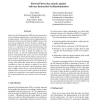Free Online Productivity Tools
i2Speak
i2Symbol
i2OCR
iTex2Img
iWeb2Print
iWeb2Shot
i2Type
iPdf2Split
iPdf2Merge
i2Bopomofo
i2Arabic
i2Style
i2Image
i2PDF
iLatex2Rtf
Sci2ools
107
click to vote
ACSAC
2006
IEEE
2006
IEEE
Known/Chosen Key Attacks against Software Instruction Set Randomization
Instruction Set Randomization (ISR) has been proposed as a form of defense against binary code injection into an executing program. One proof-of-concept implementation is Randomized Instruction Set Emulator (RISE), based on the open-source Valgrind IA-32 to IA-32 binary translator. Although RISE is effective against attacks that are not RISEaware, it is vulnerable to pure data and hybrid data-code attacks that target its data, as well to some classes of bruteforce guessing. In order to enable the design of a production version, we describe implementation-specific and generic vulnerabilities that can be used to overcome RISE in its current form. We present and discuss attacks and solutions in three categories: known-key attacks that rely on the key being leaked and then used to pre-scramble the attacking code; chosen-key attacks that use implementation weaknesses to allow the attacker to define its own key,or otherwise affect key generation; and key-guessing (“bruteforce”) attack...
ACSAC 2006 | Hybrid Data-code Attacks | Instruction Set | Open-source Valgrind Ia-32 | Security Privacy |
Related Content
| Added | 10 Jun 2010 |
| Updated | 10 Jun 2010 |
| Type | Conference |
| Year | 2006 |
| Where | ACSAC |
| Authors | Yoav Weiss, Elena Gabriela Barrantes |
Comments (0)

